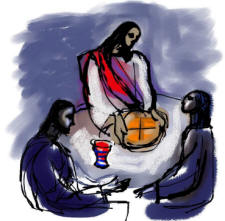Resurrection: Trust Needed – by Sean Neil-Barron
Spirited Reflection – Sunday, May 4, 2014
Sean Neil-Barron was born on Treaty 7 land in Calgary, Alberta and is a current student at Harvard Divinity School.
I don’t think it’s a coincidence that important things happen over food. First dates, family fights, communion – in sharing food together we enter into a sacred shared moment – aligning our disparate purposes as we quench the most basic of our needs. No wonder it tends to attract other associations. We know we will have to return again and again to be fed why not feed our souls as we feed our bodies.
On the road to Emmaus, as the two disciples paused and broke bread with the stranger that had accompanied them along the road: they experienced the resurrection. It was the meal together, not the walking, that broke open their knowing.
I felt an odd resonance as I read this passage from the Gospel of Luke. Not simply because I was feeling incriminated as before I had sat down to write this reflection I had fixed myself a nutritious bowl of ramen noodles and had ate it alone in my room– grad school life I tell myself. Rather it was because I remembered a fragment of history from an account of the negotiations of Treaty 7.
The negotiations were scheduled to start the afternoon of September 17th in 1877. But, as two of five invited nations had not arrived at Blackfoot Crossing, the location where the negotiations were to take place, it was decided that the formal negotiation would begin two days hence. During this delay the Government officials offered food to the gathered nations to eat. An offer that Chief Crowfoot of the Blackfoot tribe, whose wisdom and presence was greatly respected, refused. He would not accept the food unless he heard what terms the commissioners were going to offer during the negotiations of the Treaty.
They couldn’t eat together without knowing the terms of the agreement. There was not enough trust in their relationship. Food was seen as a potential weapon that could be used against them – an implicit agreement to future terms. So they ate separately.
And for the most part we still don’t have that trust. Indigenous and settler: apart. But on the road to Emmaus we are reminded: we won’t see the resurrection until we break bread together. We won’t know of God’s vision of beloved community, until we can sit at the table together with all our complexities, and share a meal.
The Canadian Government has used the signing of Treaty 7 as proof of its legal claim to most of Southern Alberta, the land where I grew up. This runs contrary to the oral histories and memories of the elders of the Treaty 7 Nations – they tell of the peace treaty with the Queen’s representatives, not of a land surrender.
I grew up in Calgary never knowing, let alone breaking bread with, a single indigenous person from the land I was born on. In Calgary, each of the major traffic arteries is named after a First Nations community or Chief. We can drive down Crowchild Trail, named after David Crowchild, Chief of the Tsuu T’ina Nation from 1946-1953, without ever knowing where the name came from.
We walk, or drive, on the road to Emmaus but we won’t find it when we arrive and that’s because for centuries now we’ve been walking together in almost complete silence. We haven’t stopped from our pursuits, sat on the dusted road, and shared what food and stories we had on hand. The disciples witnessed the truth of new life because they trusted the stranger to eat with them. There was a time in our history where we lived nation to nation with the indigenous people of this land. We could sit with each other in trust. The hope as we travel the road to Emmaus is that we will live to see that resurrected.









